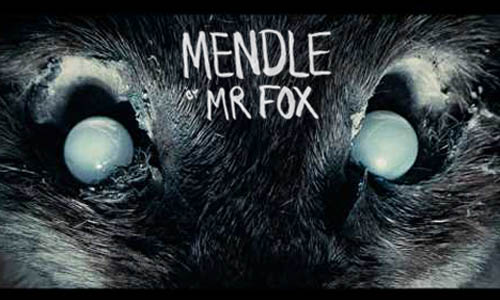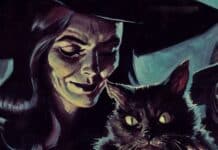DOM COOPER looks Mr Fox’s “Mendle” – a track inspired by the Pendle Witch Trials of 1612
Imagine you’re standing atop a hill in a windswept landscape. The wind blows raw. A patchwork below looks grey and sodden. Yet the beautiful, desolate place draws you in and you feel the energy of the earth. A crow’s caw catches your ear. But what was that? Was it a scream? You’re uncertain.
It was. Somewhere in the valley below, a woman has just been frightened by Demdike, the infamous witch.
A funereal organ warms into life. Wind-like washes of cymbals crash, and a witchy voice tells of an heir who would pluck jewels only to meet an icy stare. The singer is accompanied by powerful drums, banging out their trial, condemning all. The song continues, telling. Although Lucy smiled, she wondered why her body felt colder than clay.
Meet Mr Fox and their song song ‘Mendle’.
Mr Fox formed in the late sixties, coming of age in 1970, and was led by husband and wife team Bob and Carol Pegg.

Bob had earned a degree in English literature at Leeds University, and subsequently trained as a folklorist. The couple were both seasoned players around the folk club circuit, but they gradually grew away from just singing traditional song. They started to write their own lyrics, incorporating the history and stories that Bob was encountering each day. Both his fieldwork in the Yorkshire Dales, and the folklore of the area became an inspiration. So too did the sound of the traditional bands found in the surrounding villages.
Inviting other players into the fold they became an electric folk act. Similar in vein to contemporaries Fairport Convention, Steeleye Span and Fotheringay. The line up was modelled on a Dales band, with fiddle, melodeon, harmonium, clarinet, and cello. Also incorporating the modern addition of drums, bass and guitar.
Mr Fox’s eponymous album arrived in 1970, but omitted from the final release was the song ‘Mendle’. Maybe it was too loud and ominous for the time.
After the second verse the song breaks into a crashing fuzz guitar solo, probably the loudest ever in the folk-rock canon. It elevates the track into a piece of proto-doom.
Originally named after the book ‘Mist Over Pendle’. The record company feared using the actual title, so the band switched to ‘Mendle’. No harm is done though, as the spoonerism captures the spooky quality perfectly. What is a ‘Mendle’? A heady brew, meddling with your mind?
The book was written by Robert Neill, and is a fictional account of the events that lead up to the Pendle witch trial. Where local folk die mysteriously, and witchcraft is whispered to be the cause. Singer Carol Pegg was reading it at the time of the song’s conception.
The actual trials of 1612 are amongst the most famous in English history. Where 12 were accused and brought to justice. Witches with names such as Demdike and Alice Nutter. Accused of using magical pins, divination, and sharing their blood with demons. All finally admitting that they had sold their souls to the devil.
Carol’s witchy voice urges on, singing of a hand warmed by a zodiac ring.
The song swells to a finale. Those biting winds and wailing sisters play upon the girl called Lucy. Carol sings great phrases such as ‘basilled butterfly’, and ‘heard a lamenter sing’. The music swells and swirls, as the organ sound preaches backwards in darkness. Savaged by the storm, clutching at the hail. The track thunders out with some power chords and one final drum hit.
The band called it a day in 1972.










I’m pretty sure the phrase is ‘battered butterfly’ and it is a linnet that sings. After the storm comes a perfect summer morning, spoiled only by the battered and bloody naked corpse at the foot of the hill – and the last little unsettling ambiguity: The puzzled people of the village…..
“Saw the dancing leaves,
Heard a linnet sing
Saw a laughing child
Take the lady’s ring.”
Lucy, of course, is actually already dead when the song begins. Why else would her body feel “colder than clay”?